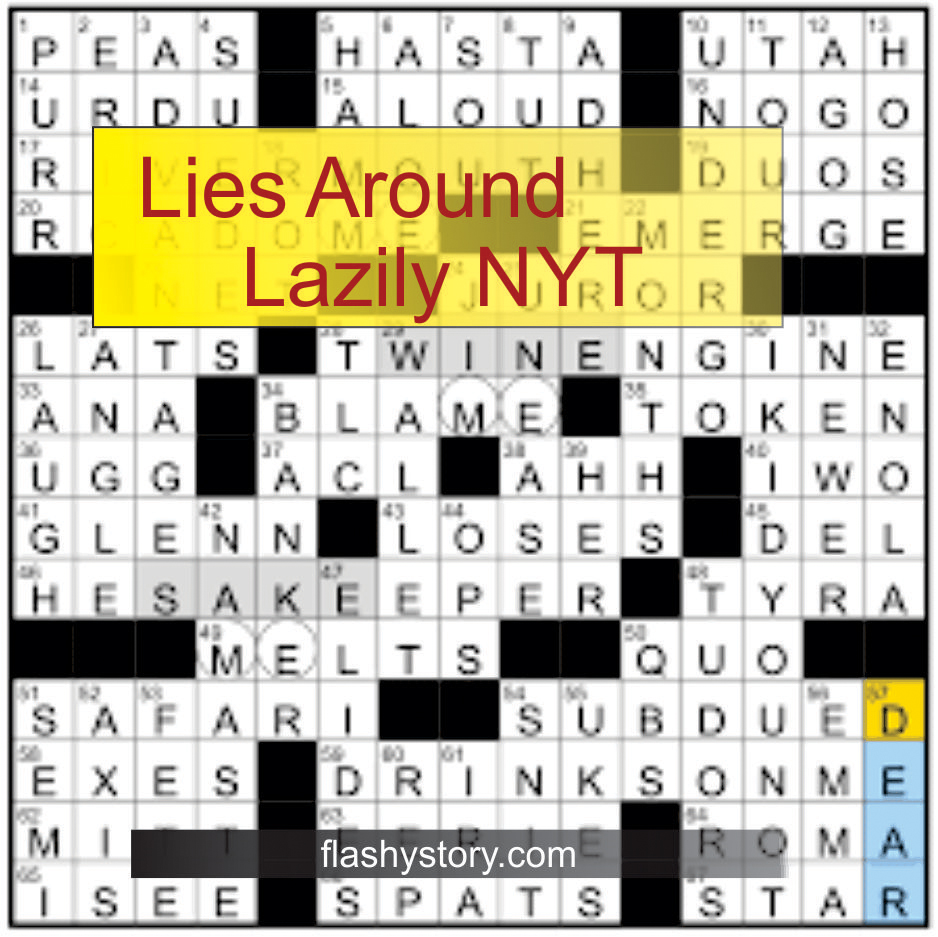Lies around lazily nyt If you’re a fan of the New York Times crossword, you have probably come across the phrase “lies around lazily nyt.” This simple yet fascinating word has puzzled and entertained many solvers. Let’s take a better look at what makes this word so interesting and a laugh to resolve.
Why We Love Crosswords
Crossword puzzles are a favorite hobby for lots people. They offer a combination of mission and rest, making them a perfect way to exercising your mind while having fun. The New York Times crossword is specifically famous due to its smart clues and wordplay. Among the ones clues, “lies round lazily” is one which stands proud.
Where “lies around lazily nyt” Comes From
The phrase “lies around lazily nyt” likely regarded within the New York Times crossword as a clue to describe a person lounging or doing nothing. The New York Times is thought for using innovative and playful language in its puzzles, making them greater enticing and reflective of how we use language every day.
What Does It Mean?
On the floor, “lies around lazily nyt” appears sincere. It makes you accept as true with you studied of someone lying down and being lazy. But in a crossword puzzle, it frequently requires a bit extra concept. Here’s a breakdown:
- Lies: Can propose to recline or to inform a falsehood.
- Around: Suggests being in no particular area or direction.
- Lazily: Means in a comfortable or sluggish manner.
Putting those together, it paints a photo of someone fun without any unique motive. But in a crossword, you want to discover a phrase or phrase that fits this description and the quantity of letters furnished.
Connecting to Culture and Literature
The concept of “lies around lazily nyt” isn’t new. Throughout records, literature and art work have often depicted humans taking element in moments of entertainment. From classic novels describing lazy afternoons to art work of human beings lounging in parks, this idea is deeply rooted in our way of life.
Even in cutting-edge-day fast-paced worldwide, human beings nevertheless crave moments of relaxation. This word taps into that point-honored choice to take a damage and unwind.
Why Crossword Fans Enjoy This Phrase
So, why do crossword enthusiasts love “lies round lazily”? It’s relatable and makes you believe you studied creatively. Many solvers can photo themselves in this usa of rest. Plus, it’s miles a amusing play on phrases that brings a satisfying undertaking. It’s clues like this that make the New York Times crossword so famous.
The Skill of Crafting Crossword Clues
Making an tremendous crossword clue is a unique skill. It needs to be difficult but additionally solvable, clever however now not too difficult. The phrase “lies around lazily nyt” hits this stability flawlessly. It’s clean enough for beginners to apprehend but has sufficient intensity to provide skilled solvers a nice “aha” 2d.
Similar Phrases in Crosswords
There are different phrases just like “lies around lazily nyt” which you would likely see in crosswords, like “takes it smooth” or “rests leisurely.” These phrases upload range and make fixing puzzles even more fun. They additionally assist boom your vocabulary and information of language.
Tips for Solving These Clues
If you’re new to crosswords, clues like “lies spherical lazily” would possibly appear difficult inside the beginning. Here are a few guidelines:
- Look at the Context: Check the encircling clues for guidelines.
- Think Flexibly: Consider one in all a kind meanings for every word.
Three. Stay Calm: Don’t strain. Sometimes the solution comes even as you least count on it.
The Fun of Solving
The real pleasure of crossword puzzles comes from the pride of locating the proper answer. Phrases like “lies spherical lazily” add to this joy via using presenting moments of connection and notion. They display that language isn’t always only for verbal exchange however additionally for fun and discovery.
Conclusion
“Lies around lazily” from the New York Times crossword is a superb example of what makes crosswords so exciting. It’s a phrase that captures a common human experience in a playful and perception-scary manner. So, subsequent time you stumble upon this or a similar phrase in your crossword-fixing journey, take a 2d to realize the cleverness at the back of it. Happy hard!
